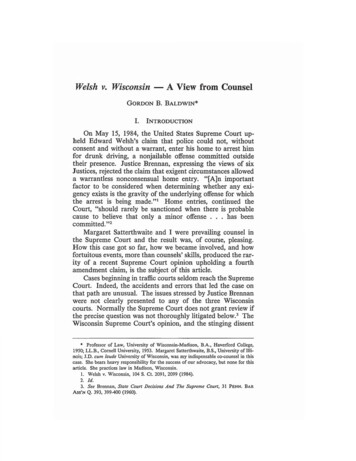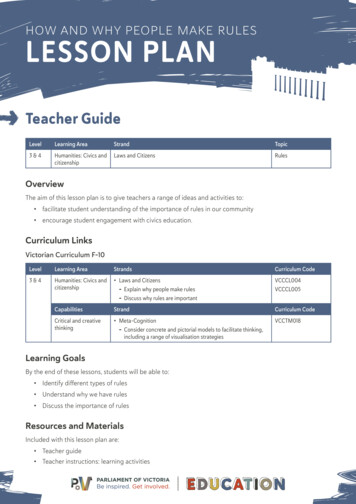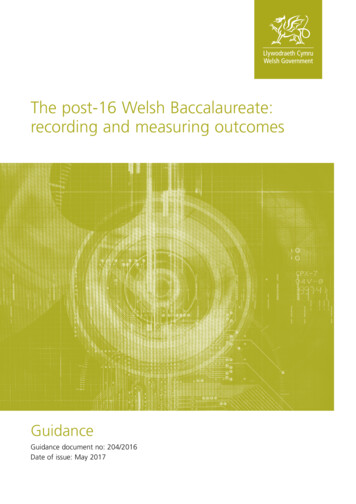
Transcription
Learn Welsh - GrammarSOME BASIC RULES OF WELSH GRAMMARCynnwysA.B.C.Ch.D.Dd.E.F.Ff.G.-ContentsY Fannod - The ArticleEnwau - NounsAnsoddeiriau - AdjectivesArddodiaid - PrepositionsBerfau - VerbsCysyllteiriau - ConjunctionsRhifau - NumbersRhagenwau - PronounsAtebion - ‘Yes / No’ RepliesCyffredinol - GeneralY Treigliadau - The MutationsY Treiglad Meddal - The Soft MutationY Treiglad Trwynol - The Nasal MutationY Treiglad Llaes - The Aspirate Mutation 2002www.bbc.co.uk/learnwelshpage 1 of 87
Learn Welsh - GrammarA. Y Fannod - The Article1. There is no indefinite article (a / an) in Welsh.e.g. cath - a catafal - an applemerch - a girlysgol - a school2. There are three forms of the definite article (the) in Welsh(i)‘y’ is used in front of a consonant. Singular, feminine nounswill undergo a Soft Mutation after ‘y’ (except thosebeginning with ‘ll’ and ‘rh’). See S.M. rule 1.e.g. ci- y cithe dogcath- y gaththe catbachgen- y bachgen the boymerch- y ferchthe girl(ii)‘yr’ is used in front of a vowel and in front of h . Remember that‘w’ and ‘y’ are vowels in Welsh.e.g.(iii)-yr ysgolyr enwyr afalyr het-the schoolthe namethe applethe hat‘’r’ is used after a word ending in a vowel - no matterwhether the word which follows begins with a vowel orwith a consonant.e.g. 2002ysgolenwafalhetMae’r plantMae’r ysgolDyma‘r llyfrDacw‘r afon-The children areThe school isHere’s the bookThere’s the riverwww.bbc.co.uk/learnwelshpage 2 of 87
Learn Welsh - GrammarB. Enwau - Nouns1. All nouns in Welsh are either masculine or feminine. There is no neuter gender.Unfortunately there is no way of telling which nouns are feminine and whichare masculine, so it is important to learn the gender at the same time as themeaning. In a dictionary ‘b’ (benywaidd) will denote feminine nouns and ‘g’(gwrywaidd) will denote masculine nouns.2. Singular, feminine nouns undergo a Soft Mutation after the definite article ‘y’(the) (except those words which begin with ‘ll’ and ‘rh’). See S.M. rule 1.e.g. tref y d refthe towncadair y gadairthe chairmerch y ferchthe girlllaw y llawthe handrhaw y rhawthe spade3. We always use singular nouns after numbers in Welsh. Although the plural of‘car’ is ‘ceir’ note the use of the singular form after numbers.e.g. one car- un carten cars - deg careight cars - wyth cartwo cars - dau gar4. Feminine nouns undergo a Soft Mutation after the numbers ‘un’ (one)(except those words which begin with ‘ll’ and ‘rh’) and ‘dwy’ (two).See S.M. rules 2 and 3.Notice that the form ‘dwy’ is used with feminine nouns only.e.g.un ferchun llawun bont-one girlone handone bridgedwy ferchdwy lawdwy bont-two girlstwo handstwo bridge5. Masculine nouns undergo a Soft Mutation after the number ‘dau’ (two).See S.M. rule 4.Notice that the form ‘dau’ is used with masculine nouns only.e.g. 2002dau fachgen dau dd yn-two boystwo mendau gidau blentyn -www.bbc.co.uk/learnwelshtwo dogstwo childrenpage 3 of 87
Learn Welsh - Grammar6. Masculine nouns after ‘tri’ (three) and all singular nouns after ‘chwe’ (six)undergo an Aspirate Mutation. See A.M. rules 1 and 2. The form ‘tri’ is usedwith masculine nouns only.e.g.tri ch effyltri ph lentyntri th ractor-three horsesthree childrenthree tractorschwe cheiniogchwe phuntchwe thegan-six pennies (pence)six poundssix toys7. Nouns will undergo a Soft Mutation after the linking ‘yn’.See S.M. rule 12.e.g. 2002Roedd Mair yn ddoctor. Mae e’n filiwnydd. (S.W.) Dydy o ddim yn b rifathro. -Mair was a doctor.He’s a millionaire.He isn’t a headmaster. (N.W.)www.bbc.co.uk/learnwelshpage 4 of 87
Learn Welsh - GrammarC. Ansoddeiriau - Adjectives1. Nearly all adjectives follow the noun in Welsh.e.g. a small / little boy bachgen bacha big / large carcar mawra high mountainmynydd uchela long filmffilm hirThere are a few exceptions to this rule - ‘hen’ (old), ‘hoff’ (favourite)and ‘prif’ (main / chief) are three of them.e.g.an old manfavourite foodmain character-hen ddynhoff fwydprif gymeriadYou’ll notice that by standing in front of the noun they cause thenoun to undergo a Soft Mutation. See S.M. rule 8.2. When an adjective follows a singular, feminine noun it undergoes a SoftMutation. See S.M. rule 7.e.g.merch fachcadair fawrsiop dd iddorolysgol dda-a little girla large chairan interesting shopa good schoolSometimes another noun can be used as an adjective or a descriptive worde.g.siop farasiop gig-bread shop (baker’s)meat shop (butcher’s)3. When an adjective stands alone in a sentence (i.e. it doesn’t standnext to the noun it describes) the linking word ‘yn’ is used in frontof it.e.g.The bus is early.The car isn’t old.The children were cold .-Mae’r bws yn gynnar.Dydy’r car ddim yn hen.Roedd y plant yn oer.This word ‘yn’ causes the adjective to undergo a Soft Mutation.See S.M. rule 12. 2002www.bbc.co.uk/learnwelshpage 5 of 87
Learn Welsh - Grammare.g.The castle is big .The film is interesting.We were hot.-Mae’r castell yn fawr.Mae’r ffilm yn ddiddorol.Roedden ni’n boeth.4. We can qualify our adjectives by placing ‘rhy’ (too), ‘gweddol’ (quite /fairly),’eitha’ (quite / fairly) or ‘lled’ (quite / fairly) between ‘yn’ and theadjective. ‘Gweddol’ will undergo a Soft Mutation after ‘yn’ but‘rhy’ and ‘lled’ will not (as rh and ll are exceptions to the rule).The full form is ‘eithaf’ but the final ‘f’ is normally dropped in the spokenlanguage. This happens in most words which end in ‘f’.All except ‘eitha’ cause the adjective which follows to undertake a Soft Mutation.See S.M. rule 9.e.g.yn weddol dd iddorolyn rhy boethyn lled dalyn eitha tew-fairly interestingtoo hotquite tallquite fat5. Comparison of adjectivesAs in English there are three methods of comparing adjectives in Welsh.(a)The largest group - to which appropriate endings are addedtalltalas tall asmor dal âtaller thanyn dalach nathe tallesty tala (m pl)y dala (f)redcochas red asmor goch âredder thanyn gochach nathe reddesty cocha (m pl)y gocha (f)The Equative degree can also be formed by adding the ending -ed tothese ‘short’ adjectives and by placing the word ‘cyn’ in front.e.g. 2002mor dal âmor goch â-cyn daled âcyn goched âwww.bbc.co.uk/learnwelshpage 6 of 87
Learn Welsh - Grammar(i)Notice the Soft Mutation after ‘mor’ and ‘cyn’. See S.M. rule 27.Note also that we do not place ‘yn’ in front of either ‘mor’ or ‘cyn’.e.g.(ii)Notice the Soft Mutation after ‘yn’. See S.M. rule 28.e.g.(iii)mae hi mor dal â fimae hi cyn daled â fimae hi’n dalach na fimae rum yn gryfach na gwinNotice the Soft Mutation after ‘y’ in the Superlative degree when it refersto a feminine noun. See S.M. rule 29.John oedd y talaAnn oedd y dala(iv)Notice the Aspirate Mutation after both ‘â’ and ‘na’.See A.M. rules 8 and 9.e.g.(v)mor dal â ch oeden / cyn daled â ch oeden yn gochach na than-as tall as a treeredder than fireYou’ll notice a change of spelling in some adjectives when endings areadded to them.w ye.g.(vi)trwm (heavy)cyn drymed âyn drymach nay trymaSome consonants hardend te.g.g cb pdrud (expensive)cyn ddruted âyn ddrutach nay drutarhad (cheap)cyn rhated âyn rhatach nay rhataAlso: gwlyb gwlypach (wetter) 2002www.bbc.co.uk/learnwelshpage 7 of 87
Learn Welsh - Grammarpwysig pwysicach (more important)(b)Adjectives which are too long to accommodate endings.Most of them end in -ol, -og, -us or -gar, but not all.interestingdiddorolas interesting asmor ddiddorol âmore interesting thanyn fwy diddorol nathe most interestingy mwya diddorol(m pl)y fwya diddorol (f)tastyblasusas tasty asmor flasus âtastier thanyn fwy blasus nathe tastiesty mwya blasus(m pl)y fwya blasus (f)(i)You’ll notice ‘long’ Welsh adjectives are not necessarily ‘long’ in Englishand vice versa(ii)One or two adjectives will follow this pattern although they are short.e.g.swil (shy)mor swil âyn fwy swil nay mwya swil(m pl)y fwya swil (f)Also: gwyllt (wild), diflas (miserable,boring), gwyntog (windy)(c)Irregular adjectivesThe following are the main irregular adjectives 2002biggreatmuchmawras big asas great asas much ascymaint âbigger thangreater thanmore thanyn fwy nathe biggestthe greatestthe mosty mwya (m pl)y fwya (f)smalllittlebachas small asas little ascyn lleied âsmaller thanless thanyn llai nathe smallestthe leasty lleia (m f pl)www.bbc.co.uk/learnwelshpage 8 of 87
Learn Welsh - Grammargooddaas good ascystal âbetter thanyn well nabaddrwgas bad ascynddrwg âworse thanyn waeth nahighuchelas high ascyfuwch âhigher thanyn uwch nathe besty gorau (m pl)yr orau (f)the worsty gwaetha (m pl)y waetha (f)the highestyr ucha (m f pl)lowiselas low ascyn ised âlower thanyn is nathe lowestyr isa (m f pl)nearagosas near ascyn agosed ânearer thanyn nes nathe nearestyr agosa (m f pl)(i)In the Equative degree the following forms are also acceptablecymaint âcyn lleied âcynddrwg âcyfuwch âcyn ised âcyn agosed â(ii)mor fawr âmor fach âmor ddrwg âmor uchel âmor isel âmor agos âIn the Comparative degree the following form is also acceptableyn nes na(d)--yn agosach naNotice that we use ‘â’ and ‘na’ in front of words which begin with a consonantand ‘ag’ and ‘nag’ in front of words which begin with a vowel.e.g.cyn dewed â mochyncyn dewed ag eliffant-yn fwy cymylog na ddoeyn fwy cymylog nag echdoeas fat as a pigas fat as an elephant-cloudier than yesterdaycloudier than the daybefore yesterdayThere is an Aspirate Mutation after both ‘â’ and ‘na’.See A.M. rules 8 and 9. 2002www.bbc.co.uk/learnwelshpage 9 of 87
Learn Welsh - Grammare.g.(e)mor fynyddig â Chymruyn dalach na choeden-as mountainous as Walestaller than a treeSentences containing either the Comparative and Equative degree followthe normal sentence pattern, with the verb at the beginning of the sentence.e.g.Mae’r llyfrgell mor bell (cyn belled) â’r orsaf.- The library is as far as the station.Ydy tþ Tom cymaint â thy Bill?- Is Tom’s house as big as Bill’s house?Roedd Tom yn dalach na Bill.- Tom is taller than Bill.Mae’r ferch yn dewach na’r bachgen.- The girl is fatter than the boy.But when we use the Superlative degree of the adjective we must use theemphatic pattern - i.e. the verb doesn’t come at the beginning of thesentence.e.g.Efrog Newydd ydy’r pella.- New York is the farthest.Castell Windsor ydy’r mwya ym Mhrydain? - Ie/Ia- Windsor Castle is the largest in Britain? - YesMuhammed Ali oedd y gorau.- Muhammed Ali was the best.Note that the verb will always be in the third person singular:e.g.Fi ydy’r gorau.Chi ydy’r tala.Nhw ydy’r gwaetha.Nhw oedd y gwaetha.I am the best.You are the tallest.They are the worst.They were the worst.In English we cannot use the Superlative degree when comparing only 2things. We must use the Comparative degree.e.g. Tom and Paul. Tom is the taller.(not ‘tallest’)This rule doesn’t apply in Welsh.e.g. Tom a Paul. Tom ydy’r tala . 2002www.bbc.co.uk/learnwelshpage 10 of 87
Learn Welsh - GrammarCH. Arddodiaid - Prepositions1. ‘ar’ (on) is followed by a Soft Mutation. See S.M. rule 10.e.g.bwrdd y geginllong‘ar’ has personal forms-ar fwrdd y geginar long-on the kithchen tableon a ship-arna iarnat tiarno fe (S.W.)arno fo (N.W.)arni hiarnon niarnoch chiarnyn nhw‘ar’ is used after certain verbs. Here are two:gwrando ar edrych are.g.to listen toto look atWyt ti’n gwrando arna’ i?- Are you listening to me?Maen nhw’n edrych arnon ni.- They’re looking at us.2. ‘i’ (to) and ‘o’ (from / of) are followed by a Soft Mutation. See S.M. rule 10.e.g.O Gaergybi i Gaerdydd.O Ddolgellau i Bontypridd.Llun o Gastell Harlech.(a)‘i’ has personal forms --From Holyhead to Cardiff.From Dolgellau to Pontypridd.A picture of Harlech Castle.i mi / fii tiiddo fe (S.W.)iddo fo (N.W.)iddi hii nii chiiddyn nhw‘i’ is used after certain verbs. Here are two:gofyn irhoi ie.g. 2002-to askto giveRydw i’n rhoi anrheg iddi hi.www.bbc.co.uk/learnwelshpage 11 of 87
Learn Welsh - Grammar- I’m giving her a present (giving a present to her).Wyt ti wedi gofyn iddyn nhw?- Have you asked them?‘i’ is used in the ‘rhaid’ (must) pattern. See BERFAU - VERBS.e.g.(b)Mae rhaid iddyn nhw golli pwysau.- They must lose weight.Oes rhaid iddo fo (N.W.) fynd at y deintydd?- Does he have to go to the dentist?‘o’ has personal forms -e.g.ohono’ iohonot tiohono fe S.W.ohono fo N.W.ohoni hiohonon niohonoch chiohonyn nhwDyma rai ohonyn nhw.- Here are some of them.Wyt ti wedi gweld llun ohoni hi?- Have you seen a photograph of her?3. ‘am’ (about / for) is followed by a Soft Mutation. See S.M. rule10.e.g.am ddau fisam b edair blynedd -for two monthsfor four years(‘dau’ is used with a masculine noun)(‘pedair’ is used with a feminine noun)‘am’ has personal forms -amdana’ iamdanon niamdanat tiamdanoch chiamdano fe (S.W.) amdanyn nhwamdano fo (N.W.)amdani hi‘am’ is used after certain verbs. Here are five:aros amchwilio amedrych amsiarad am 2002-to wait forto search forto look for / to visitto talk aboutwww.bbc.co.uk/learnwelshpage 12 of 87
Learn Welsh - Grammarpoeni ame.g.-to worry aboutMaen nhw’n siarad amdanoch chi.- They’re talking about you.Wyt ti’n poeni amdani hi?- Are you worrying about her?4. ‘at’ (to / towards) is followed by a Soft Mutation. See S.M. rule 10.e.g.at dd rws yr ystafellat reolwr y siop‘at’ has personal forms --to the door of the roomto the manager of the shopata’ iatat tiato fe (S.W.)ato fo (N.W.)ati hiaton niatoch chiatyn nhw‘at’ is used after certain verbs. Here are three:ysgrifennu atanfon atcofio ate.g.-to write toto send toto remember toWyt ti’n mynd i ysgrifennu ati hi?- Are you going to write to her?Dw i wedi anfon llythyr atyn nhw.- I have sent them a letter. (sent a letter to them)5. ‘gan’ also has personal forms - in different dialects the various forms can soundslightly different in pronunciation.gen igen tigan Siân / gynni higan Siôn / gynno fogynnon nigynnoch chigan y plant / gynnyn nhwIn North Wales these forms are used in the ‘possession ‘pattern. Notice that theverb at the beginning is always in the 3rd person singular (‘mae / roedd’) and thatnoun which follows the pattern undergoes a Soft Mutation. See S.M. rule 23. 2002www.bbc.co.uk/learnwelshpage 13 of 87
Learn Welsh - Grammare.g.Mae gen i gath.Roedd gen i ddau gi.-We’ve got a cat.I had two dogs.Notice the spoken forms of the negative pattern in North WalesDoes gen i ddimDoes gen ti ddimDoes gan Tom ddimDoes gynno fo ddimDoes gynni hi ddim-Sgen i ddimSgen ti ddimSgan Tom ddimSgynno fo ddimSgynni hi ddimDoes gynnon ni ddimDoes gynnoch chi ddimDoes gynnon nhw ddim-Sgynnon ni ddimSgynnoch chi ddimSgynnyn nhw ddimNotice the spoken forms of the question pattern in North WalesOes gen i?Oes gen ti?Oes gan Tom?Oes gynno?Oes gynni hi?-Oes gynnon ni?Oes gynnoch chi? Oes gynnon nhw? -Sgen i?Sgen ti?Sgan Tom?Sgynno fo?Sgynni hi?Sgynnon ni?Sgynnoch chi?Sgynnyn nhw?6. In South Wales the following pattern is normally usedMae car gyda fi.Does dim ci gyda Tom.-I have a car.Tom doesn’t have a dog.‘gyda’ is often abbreviated to ‘da’ - especially in speech.Mae car ‘da fi.Does dim ci ‘da Tom. 2002-I have a car.Tom doesn’t have a dog.www.bbc.co.uk/learnwelshpage 14 of 87
Learn Welsh - Grammar7.‘yn’ (in) causes a Nasal Mutation. See N.M. rule 1.e.g.Dolgellau - yn N olgellautþ Bob - yn nhþ Bob‘yn’ changes to ‘ym’ if the word which follows it begins with an me.g.Bangor - ym Mangorparc y dref - ym mharc y dref‘yn’ changes to ‘yng’ if the word which follows it begins with nge.g.Gardd Eden - yng Ng ardd EdenCymru - yng Nghymru8. Don’t confuse ‘mewn’ (in a) with ‘yn’ (in) or ‘yn y’ (in the).e.g.mewn tþ - in a housemewn car - in a caryn y tþ - in the houseyn y car - in the car9. We all know that it is considered grammatically incorrect to end a sentencewith a preposition in English (but we often hear such sentences in the spokenlanguage).e.g.This is the house I live in.Whom are you talking about?( in which I live)(About whom are you talking?)This rule does not apply in Welsh - so long as the ‘personal’ form of thepreposition is used.e.g.Dyma’r tþ dw i’n byw ynddo.- This is the house I live in.(refers to ‘tþ’ which is masculine )Pwy ydy’r plant rydyn ni’n gwrando arnyn?- Who are the children we’re listening to?(refers to ‘plant’ which is plural)Pwy oedd y ferch roedden nhw’n edrych amdani?- Who was the girl they were looking for?(refers to ‘merch’ which is feminine ) 2002www.bbc.co.uk/learnwelshpage 15 of 87
Learn Welsh - GrammarD. Berfau - Verbs1. The Present TenseAll verb -nouns are added to various persons of the verb ‘to be’ linked by ‘yn’. There is no mutation after this linking ‘yn’.(a)The Affirmative formsStandard formsSpoken formsRydw iRwyt tiRydych chiDw i-I am / doYou are / do (familiar)You are / do (polite)Mae Tom / BethanMae’r carMae e (S.W.)Mae o (N.W.)Mae hi-Tom / Bethan is /doesThe car is / doesHe / It (masc) is / does-She / It (fem) is / doesRydyn ni-We are / do-You are / do-The children are / doThey are / doDych chi S.W.Dach chi N.W.Dyn ni S.W.Dan ni N.W.Rydych chi Dych chi S.W.Dach chi N.W.Mae’r plant*Maen nhwe.g.Dw i’n byw yn Llandudno.- I am living in Llandudno.This is the literal translation of the Welsh sentence. It can also convey- I live in Llandudno.- I do live in Llandudno.and common sense will tell you which version makes the most sense inthat particular context.* Notice that the singular form of the verb is used with all nouns - evenwith plural nouns. 2002www.bbc.co.uk/learnwelshpage 16 of 87
Learn Welsh - Grammare.g.Mae’r plant yn mynd i’r ysgol ar y bws.- The children are going to school on the bus.- The children go to school on the bus.Mae’r staff yn gweithio’n hwyr.- The staff are working late.More examplesDych chi’n gweithio’n galed.- You are working hard.- You work hard.- You do work hard.Mae hi’n siopa yn Llundain.- She is shopping in London.- She shops in London.- She does shop in London.(b)The Negative formsDydw i ddimDwyt ti ddimDydych chi ddimDydy Tom / Bethan ddimDydy’r car ddimDydy e ddim (S.W.)Dydy o ddim (N.W.)Dydy hi ddimDydyn ni ddimDydych chi ddimDydy’r plant ddim*Dydyn nhw ddim-I’m not / don’tYou’re (familiar) not / don’tYou’re (polite) not / don’tTom / Bethan isn’t / doesn’tThe car isn’t / doesn’tHe / It (masc) isn’t / doesn’t-She / It (fem) isn’t / doesn’tWe aren’t / don’tYou aren’t / don’tThe children aren’t / don’tThey aren’t / don’tAs with the Affirmative forms (see (a) above) the spoken forms can vary.i.e.e.g. 2002Dydw i ddimDydych chi ddim-Dw i ddimDych chi ddim (S.W.)Dach chi ddim (N.W.)Dydyn ni ddimDyn ni ddim (S.W.)Dan ni ddim (N.W.)Dydy hi ddim yn siopa yn Llundain.www.bbc.co.uk/learnwelshpage 17 of 87
Learn Welsh - Grammar- She isn’t shopping in London.- She doesn’t shop in London.Dych / Dach chi ddim yn gweithio’n galed.- You aren’t work ing hard.- You don’t work hard.Dw i ddim yn byw yn Llandudno.- I am not living in Llandudno.- I don’t live in Llandudno.Dydy’r plant ddim yn chwarae pêl droed yn y parc.- The children are not playing football in the park.- The children don’t play football in the park.Notice that the linking word ‘yn’ follows ‘ddim’.* Notice that the singular form of the verb is used with all nouns - evenwith plural nouns.(c)The Question forms and the ’No / Yes’ repliesYdw i ?-Am / Do I?-Wyt ti?Ydych chi ?Ydy Tom / Bethan?Ydy’r car?Ydy e? (S.W.)Ydy o? (N.W.)Ydy hi?-Are / Do you? (familiar)Are / Do you? (polite)Is / DoesTom / Bethan?Is the car?Is / Does he / it (masc)?-Is / Does she / it (fem)?-(Nac) Wyt (fam) /Ydych (pol)(Nac) Ydw(Nac) Ydw(Nac) Ydy(Nac) Ydy(Nac) Ydy(Nac) Ydy(Nac) YdyYdyn ni?Ydych chi?Ydy’r plant?*Ydyn nhw?-Are / Do we?Are / Do you?Are / Do the children?Are / Do they?-(Nac) Ydyn / Ydych(Nac) Ydyn(Nac) Ydyn(Nac) YdynRemember the colloquial forms as mentioned in (a) and (b) above.Ydw i ?Ydych chi ? - 2002Dw i?Dych chi? (S.W.)Dach chi? (N.W.)www.bbc.co.uk/learnwelshpage 18 of 87
Learn Welsh - GrammarYdyn ni?-Dyn ni? (S.W.)Dan ni? (N.W.)and the replies.Ydyn / Nac ydyn e.g.Ydan / Nac ydan (N.W.)Ydy hi’n siopa yn Llundain? - Ydy.- Is she shopping in London? - Yes (she is).- Does she shop in London? - Yes (she does).Dych chi’n gweithio’n galed? - Nac ydw.- Are you working hard? - No (I’m not).- Do you work hard? - No (I don’t).Dw i’n byw yn Llandudno? - Wyt / Ydych.- Am I living in Llandudno? - Yes (you are).- Do I live in Llandudno? – Yes (you do)Ydy’r plant yn cerdded i’r ysgol? - Ydyn.- Are the children walking to school ? - Yes (they are).- Do the children walk to school? - Yes (they do).* Notice that the singular form of the verb is used with all nouns - evenwith plural nouns.2. Notice the following indefinite formsMaeDoes dimIs there / Are there? e.g.There is / areThere isn’t / aren’tOes? ( answer Nac oes - No / Oes - Yes)Mae ci yn eistedd wrth y drws.- There is a dog sitting by the door.Mae plant yn chwarae yn y parc.- There are children playing in the park.Does dim ci yn eistedd wrth y drws.- There isn’t a dog sitting by the door.Does dim plant yn chwarae yn y parc.- There aren’t children playing in the park. 2002www.bbc.co.uk/learnwelshpage 19 of 87
Learn Welsh - GrammarOes ci yn eistedd wrth y drws? - Oes.- Is there a dog sitting by the door? - Yes.Oes plant yn chwarae yn y parc? - Nac oes.- Are there children playing in the park? - No.In North Wales the word ’na is placed after ‘Mae / Oes? ‘ and ‘Does’.As you can see in the following examples it causes a Soft Mutation.See S.M. rule 30.Mae ‘na gi yn eistedd wrth y drws.- There is a dog sitting by the door.Mae ‘na b lant yn chwarae yn y parc.- There are children playing in the park.Does ‘na ddim ci yn eistedd wrth y drws.- There isn’t a dog sitting by the door.Does ‘na ddim plant yn chwarae yn y parc.- There aren’t children playing in the park.Oes ‘na g i yn eistedd wrth y drws? - Oes.- Is there a dog sitting by the door? - Yes.Oes ‘na b lant yn chwarae yn y parc? - Nac oes.- Are there children playing in the park? - No.3. The Imperfect (was / were / used to) TenseAs in the Present Tense, all verb-nouns are added to various persons of theImperfect Tense of the verb ‘to be’ - linked again by ‘yn’. There is no mutationafter this linking ‘yn’.(a)The Affirmative formsStandard formsSpoken formsRoeddwn iRo’n iRoeddet tiRo’t tiRoeddech chiRo’ch chiRoedd Tom / BethanRoedd y carRoedd e (S.W.)Roedd o (N.W.)Roedd hi 2002-I wasYou were (familiar)You were (polite)Tom / Bethan wasThe car wasHe / It (masc) was-She / It (fem) waswww.bbc.co.uk/learnwelshpage 20 of 87
Learn Welsh - GrammarRoedden niRoeddech chiRoedd y plant*Roedden nhwe.g.Ro’n niRo’ch chiRo’n nhw-We wereYou wereThe children wereThey wereRoeddwn i’n byw yn Llandudno.- I was living in Llandudno.Roeddech chi’n gweithio’n galed.- You were working hard.Roedd hi’n siopa yn Llundain.- She was shopping in London.* Notice that the singular form of the verb is used with all nouns - evenwith plural nouns.e.g.Roedd y llyfrau ar y bwrdd.- The books were on the table.In North Wales, the standard forms are generally heard in speech,although the shortened 1st person form ‘ro’n i’ is commonly used.(b)The Negative formsStandard formsDoeddwn i ddimDo’n i ddimDoeddet ti ddimDo’t ti ddimDoeddech chi ddimDo’ch chi ddimDoedd Tom / Bethan ddimDoedd y car ddimDoedd e ddim (S.W.)Doedd o ddim (N.W.)Doedd hi ddim-I wasn’tYou weren’t (familiar)You weren’t (polite)Tom / Bethan wasn’tThe car wasn’tHe / It (masc) wasn’t-She / It (fem) wasn’tDoedden ni ddimDoeddech chi ddimDoedd y plant ddim*Doedden nhw ddim-We weren’tYou weren’tThe children weren’tThey weren’te.g. 2002Spoken formsDo’n ni ddimDo’ch chi ddimDo’n nhw ddimDoedd hi ddim yn siopa yn Llundain.www.bbc.co.uk/learnwelshpage 21 of 87
Learn Welsh - Grammar- She wasn’t shopping in London.Doeddech chi ddim yn gweithio’n galed.- You weren’t working hard.Doeddwn i ddim yn byw yn Llandudno.- I wasn’t livimg in Llandudno.Doedd y plant ddim yn y gwely.- The children weren’t in bed.Remember that in negative sentences the linking ‘yn’ comes after‘ddim’* Notice that the singular form of the verb is used with all nouns - evenwith plural nouns.e.g.Doedd y mynyddoedd ddim yn uchel.- The mountains weren’t high.In North Wales, the only shortened form generally heard is the 1st personsingular, otherwise the stsndard forms are in common use.(c)The Question forms and the ’No / Yes’ repliesOeddwn i ?-Was I?-Oeddet ti?Oeddech chi ?Oedd Tom / Bethan? Oedd y car?Oedd e? (S.W.)Oedd o? (N.W.)Oedd hi?-Were you? (familiar) Were you? (polite) WasTom / Bethan? Was the car?Was he / it (masc)? Was she / it (fem)? -Oedden ni?-Were we?Oeddech chi?Oedd y plant?*Oedden nhw?-Were you?Were the children? Were they?--(Nac) Oeddet (fam) /Oeddech (pol)(Nac) Oeddwn(Nac) Oeddwn(Nac) Oedd(Nac) Oedd(Nac) Oedd(Nac) Oedd(Nac) Oedd(Nac) Oedden /Oeddech(Nac) Oedden(Nac) Oedden(Nac) OeddenThe spoken forms are often abbreviated as we’ve seen in (a) and (b) aboveO’n i? 2002-(Nac) o’t / o’chwww.bbc.co.uk/learnwelshpage 22 of 87
Learn Welsh - GrammarO’t ti?O’ch chi?O’n ni?O’ch chi?O’n nhw?e.g.-(Nac) o’n(Nac) o’n(Nac) o’n / o’ch(Nac) o’n(Nac) o’nOedd hi’n siopa yn Llundain? - Oedd.- Was she shopping in London? - Yes (she was).Oeddech chi’n gweithio’n galed? - Nac oeddwn.- Were you working hard? - No (I wasn’t).Oeddwn i’n rhy hwyr? - Oeddet / Oeddech.- Was I too late? - Yes (you were).* Notice that the singular form of the verb is used with all nouns - evenwith plural nouns.(d)Indefinite formsUnlike the present tense where definite and indefinite forms aredistinguished by the use of ‘ydy’ and ‘oes’ respectively, no different formis required in the imperfect tense:Roedd hi’n braf.Roedd problem .(S.W.)Roedd ‘na broblem. (N.W.)-It was fine.There was a problem.Oedd John yno?Oedd llawer yno? (S.W.)Oedd ‘na lawer yno? (N.W.)-Was John there?Were there many there?Oedd / Nac oedd-Yes / NoDoedd yr ateb ddim yn iawn.Doedd dim ateb (S.W.)Doedd ‘na ddim ateb. (N.W.)-The answer wasn’t right.There was no answer.4. The Perfect (‘wedi’) TenseOnce again the forms of the Present Tense of the verb ‘to be’ are used with allverb-nouns - but this time the linking word is ‘wedi’ (i.e. ‘wedi’ takesthe place of ‘yn’). Again, there is no mutation after ‘wedi’. Therefore the linking 2002www.bbc.co.uk/learnwelshpage 23 of 87
Learn Welsh - Grammarwords ‘yn’ and ‘wedi’ cannot appear in the same sentence.(a)The Affirmative formsStandard formsSpoken formsRydw iRwyt tiRydych chiDw iDych chi S.W.Dach chi N.W.Mae’r carMae e (S.W.)Mae o (N.W.)Mae hiRydyn niDyn ni S.W.Dan ni N.W.Dych chi S.W.Dach chi N.W.Rydych chiMae’r plant*Maen nhw* Notice that the singular form of the verb is used with all nouns - evenwith plural nouns.e.g.(b)Dw i wedi byw yn Llandudno.- I have lived in Llandudno.Dych chi wedi gweithio’n galed.- You have worked hard.Mae hi wedi siopa yn Llundain.- She has shopped in London.The Negative formsDydw i ddim(‘Dw i ddim)Dwyt ti ddimDydych chi ddimDydy Tom / Bethan ddimDydy’r car ddimDydy e ddim (S.W.)Dydy o ddim (N.W.)Dydy hi ddim 2002Dydyn ni ddimDydych chi ddimDydy’r plant ddim*Dydyn nhw ddimwww.bbc.co.uk/learnwelshpage 24 of 87
Learn Welsh - Grammar* Notice that the singular form of the verb is used with all nouns - evenwith plural nouns.As with the Affirmative forms (see (a) above) the spoken forms can vary.i.e.e.g.(c)Dydw i ddimDydych chi ddim-Dydyn ni ddim-Dw i ddimDych chi ddim (S.W.)Dach chi ddim (N.W.)Dyn ni ddim (S.W.)Dan ni ddim (N.W.)Dydy hi ddim wedi siopa yn Llundain.- She hasn’t shopped in London.Dych chi ddim wedi gweithio’n galed.- You haven’t worked hard.Dw i ddim wedi byw yn Llandudno.- I have not lived in Llandudno.The Question forms and the ’No / Yes’ replies (S.W.)Ydw i ?-Wyt ti?Ydych chi ?Ydy Tom / Bethan?Ydy’r car?Ydy e? (S.W.)Ydy o? (N.W.)Ydy hi?-(Nac) Wyt (fam) /Ydych (pol)(Nac) Ydw(Nac) Ydw(Nac) Ydy(Nac) Ydy(Nac) Ydy-(Nac) YdyYdyn ni?Ydych chi?Ydy’r plant?*Ydyn nhw?-(Nac) Ydyn / Ydych(Nac) Ydyn(Nac) Ydyn(Nac) Ydyn* Notice that the singular form of the verb is used with all nouns - evenwith plural nouns.You’ll notice that the ‘Yes / No’ replies are the same as for the PresentTense. 2002www.bbc.co.uk/learnwelshpage 25 of 87
Learn Welsh - GrammarIn North Wales also people will reply to all persons of the verb by usingDoNaddo-YesNoRemember the colloquial forms as mentioned in (a) and (b) above.Ydw i ?Ydych chi ? Ydyn ni?-Dw i?Dych chi? (S.W.)Dach chi? (N.W.)Dyn ni? (S.W.)Dan ni? (N.W.)and the replie s Ydyn / Nac ydyn e.g.Ydan / Nac ydan (N.W.)Ydy hi wedi siopa yn Llundain? - Ydy / Do- Has she shopped in London? - Yes (she has).Ydych chi wedi gweithio’n galed? - Nac ydw / Naddo.- Have you worked hard? - No (I haven’t).Ydw i’n byw yn Llandudno? - Wyt / Ydych / Do.- Have I lived in Llandudno? - Yes (you have).5. The Pluperfect TenseThis is the farthest back in time that we can go.In this Tense we use the Imperfect Tense forms of the verb ’to be’ togetherwith the linking word ‘wedi’. Again, remember that the linking words ‘yn’and ‘wedi’cannot be used in the same sentence.(a) 2002The Affirmative formsStandard formsSpoken formsRoeddwn iRoeddet tiRoeddech chiRoedd Tom / BethanRoedd y carRoedd e (S.W.)Ro’n iRo’t tiRo’ch chiwww.bbc.co.uk/learnwelshpage 26 of 87
Learn Welsh - GrammarRoedd o (N.W.)Roedd hiRoedden niRoeddech chiRoedd y plant*Roedden nhwRo’n niRo’ch chiRo’n nhw* Notice that the singular fo rm of the verb is used with all nouns - evenwith plural nouns.e.g.(b)Roeddwn i wedi byw yn Llandudno.- I had lived in Llandudno.Roeddech chi wedi gweithio’n galed.- You had worked hard.Roedd hi wedi siopa yn Llundain.- She had shopped in London.The Negative formsStandard formsSpoken formsDoeddwn i ddimDoeddet ti ddimDoeddech chi ddimDoedd Tom / Bethan ddimDoedd y car ddimDoedd e ddim (S.W.)Doedd o ddim (N.W.)Doedd hi ddimDo’n i ddimDo’t ti ddimDo’ch chi ddimDoedden ni ddimDoeddech chi ddimDoedd y plant ddim*Doedden nhw ddimDo’n ni ddimDo’ch chi ddimDo’n nhw ddim* Notice that the singular form of the verb is used with all nouns - evenwith plural nouns.e.g. 2002Doedd hi ddim wedi siopa yn Llundain.- She hadn’t shopped in London.Doeddech chi ddim wedi gweithio’n galed.www.bbc.co.uk/learnwelshpage 27 of 87
Learn Welsh - Grammar- You hadn’t worked hard.Doeddwn i ddim wedi
Most of them end in -ol, -og, -us or -gar, but not all. interesting as interesting as more interesting than the most interesting diddorol mor ddiddorol â yn fwy diddorol na y mwya diddorol











